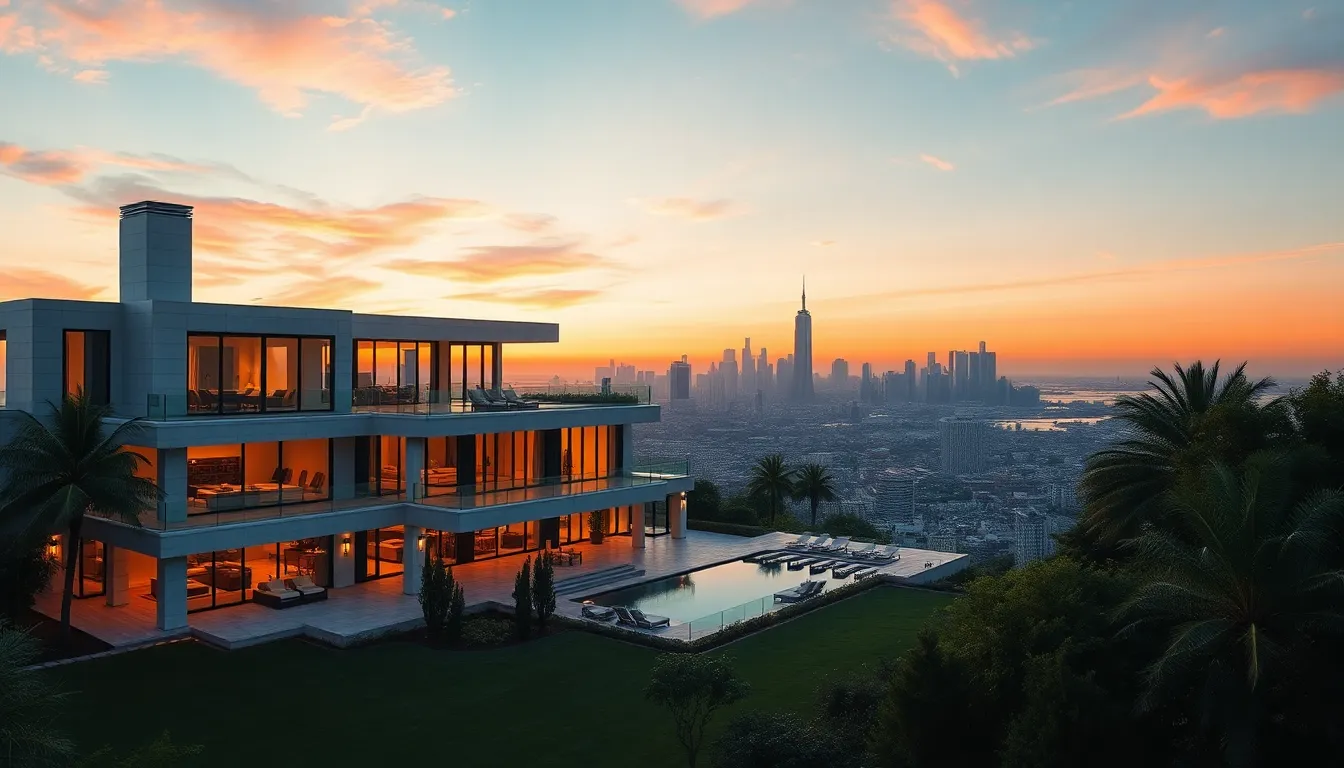In a world where the rich get richer, the luxury real estate market stands as a glittering testament to opulence and sophistication. Picture this: sprawling mansions with infinity pools, panoramic views that could make a postcard jealous, and amenities that make five-star hotels look like budget motels. It’s not just about owning property; it’s about owning a slice of paradise that screams, “I’ve arrived!”
As the demand for luxury homes continues to soar, savvy investors are diving into this plush pool of opportunity. Whether it’s a penthouse in the city or a beachfront villa, the luxury real estate market offers more than just square footage; it offers a lifestyle that turns heads and opens doors. So grab your sunglasses and get ready to explore the dazzling world of high-end properties that redefine what it means to live large.
Table of Contents
ToggleOverview Of The Luxury Real Estate Market
Luxury real estate represents the upper echelon of property investments, characterized by high-end amenities and premium locations. Exclusive neighborhoods in cities like New York, Los Angeles, and Miami attract affluent buyers seeking unparalleled lifestyles. Unique features such as expansive outdoor spaces, state-of-the-art technology, and custom designs often define these properties.
A significant trend in the luxury market shows rising demand for sustainable and eco-friendly homes. Buyers increasingly prioritize energy efficiency and sustainable materials, influencing design choices in new constructions. Moreover, the impact of globalization cannot be ignored, as international buyers expand the market significantly, drawn by high-end offerings in various locations.
Data indicates that the luxury real estate market maintains resilience, even in fluctuating economic conditions. According to recent reports, sales of properties exceeding $1 million outperformed predictions, showcasing this sector’s strength. The trend toward remote work also drives demand for larger homes with dedicated office spaces, continuing the growth of the luxury sector.
Investors view luxury real estate not only as a status symbol but also as a hedge against economic uncertainty. Appreciation rates in this market often exceed those in traditional real estate, making it a compelling option for both personal enjoyment and financial gain. Overall, the luxury real estate market exemplifies sophistication, attracting discerning buyers who desire the finest living experiences while seeking financial opportunities.
Current Trends In Luxury Real Estate

The luxury real estate market continues to evolve, showcasing distinctive trends and patterns that are reshaping its landscape.
Market Growth Statistics
Recent data indicates a consistent growth trajectory in the luxury market. In 2022, sales of properties priced above $1 million increased by 38%, highlighting strong buyer interest despite economic challenges. Luxury homes valued over $3 million experienced even greater demand, with sales rising by 42%. With appreciation rates standing at 6.5% annually, luxury real estate consistently outperforms traditional home markets. Investors recognize luxury properties as a resilient asset class, offering both prestige and financial security.
Popular Luxury Locations
Exclusive neighborhoods in cities like New York, Los Angeles, and Miami continue to attract affluent buyers. New York’s Upper East Side is highly sought after for its cultural prestige and stunning skyline views. In Los Angeles, areas like Beverly Hills showcase extravagant estates and celebrity residences, while Miami’s South Beach offers luxurious waterfront properties. International markets such as London and Dubai draw buyers seeking investment opportunities. Growing interest in resort-style living has made locations like Aspen and Palm Springs increasingly popular among wealthy individuals.
Key Factors Driving Luxury Real Estate
Economic factors play a crucial role in shaping the luxury real estate market. Heightened affluence and increasing disposable incomes among buyers lead to greater interest in high-end properties. A booming stock market often enhances wealth, prompting luxury property purchases. Additionally, low interest rates create favorable financing conditions, encouraging buyers to invest in luxury homes. Inflation rates can also impact property values, motivating investors to secure tangible assets for wealth preservation.
Buyer preferences have shifted significantly in recent years. Many affluent individuals prioritize unique features and personalization in their homes. Open floor plans and spacious outdoor areas attract attention, providing ample space for gatherings and relaxation. Sustainability has emerged as a critical factor, with eco-friendly homes gaining popularity among buyers who value environmental responsibility. Security features and smart home technology further draw in discerning clients seeking peace of mind and convenience. Overall, these preferences continue to shape the luxury real estate landscape, influencing supply and demand.
Challenges In The Luxury Real Estate Market
The luxury real estate market faces several significant challenges that can impact its growth and sustainability.
Market Saturation
Market saturation poses a notable challenge as the influx of high-end properties leads to increased competition among sellers. Affluent buyers may find a multitude of options, which can drive prices down despite the overall demand. The expansion of luxury developments in popular areas contributes to this issue, particularly in cities like New York and Los Angeles. With 42% increase in sales for properties over $3 million, maintaining exclusivity becomes tougher. Buyers often seek unique offerings, driving sellers to differentiate their listings. Distinctive features thus play a crucial role in attracting discerning clientele.
Regulatory Issues
Regulatory issues create hurdles that can affect transactions in the luxury real estate market. Zoning laws and property taxes differ widely across regions, complicating the buying process. Stricter regulations around foreign investments can deter international buyers who previously fueled market growth. Affluent individuals may also face bureaucratic delays during purchasing, impacting decision timelines. Local governments increasingly impose regulations aimed at curbing speculation, further influencing the dynamics of luxury sales. Addressing these issues effectively is essential for maintaining market vitality.
Future Outlook Of Luxury Real Estate
Projected growth in the luxury real estate market remains robust, driven by evolving buyer preferences and macroeconomic factors. Sales of properties priced above $1 million surged by 38% in 2022, while those over $3 million increased by 42%. Strong appreciation rates, standing at 6.5% annually, continue to position luxury real estate as a resilient asset class.
Affluent buyers increasingly seek unique features, such as eco-friendly designs and smart home technology. Open floor plans and spacious outdoor areas attract significant interest. Increasing disposable incomes contribute to purchasing power, ensuring a solid foundation for continued market expansion.
Investors recognize the allure of exclusive neighborhoods, making areas such as New York’s Upper East Side and Beverly Hills desirable destinations. International buyers also elevate market dynamics, targeting properties in global hotspots like London and Dubai. Resort-style living’s rise enhances the popularity of locations like Aspen and Palm Springs, appealing to wealthy individuals seeking leisure and comfort.
Challenges do persist within the luxury real estate market. An influx of high-end properties leads to market saturation, increasing competition among sellers. Regulatory issues, including zoning laws and property taxes, can complicate transactions. Stricter regulations aimed at speculation further impact luxury sales.
Maintaining market vitality requires addressing these obstacles directly. Embracing innovative solutions and understanding evolving consumer demands remains crucial. Optimism persists as luxury real estate continues to thrive, balancing aspirations and realities in an ever-changing landscape.
The luxury real estate market continues to captivate affluent buyers with its promise of opulence and lifestyle enhancement. As preferences shift towards sustainability and unique features, properties are evolving to meet these demands. Despite facing challenges like market saturation and regulatory hurdles, the market shows resilience and growth potential.
Investors are increasingly recognizing the value of high-end properties as both status symbols and sound financial investments. With ongoing trends favoring eco-friendly designs and smart technology, the luxury market is poised for further expansion. The allure of exclusive neighborhoods remains strong, ensuring that luxury real estate will remain a sought-after asset for years to come.






